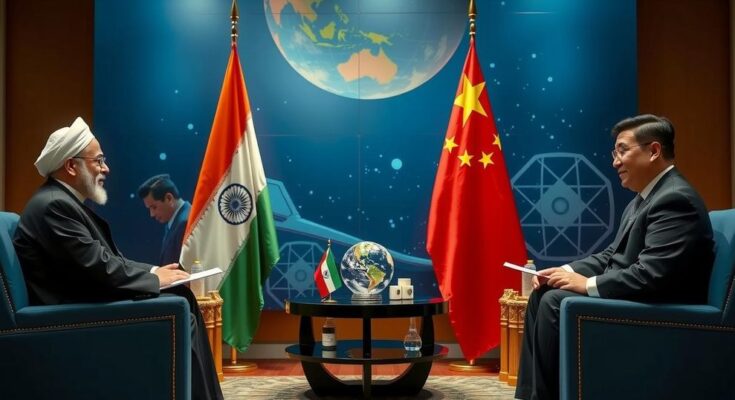Russian President Vladimir Putin hosted the BRICS Summit to discuss creating a “new world order” aimed at reducing reliance on the U.S. dollar and Western dominance. The summit includes participation from key nations like Iran, India, and China, focusing on enhanced cooperation and addressing economic sanctions. With the expanding BRICS bloc now representing half of the global population, the discussions signal a significant shift in global economic dynamics.
This week, Russian President Vladimir Putin initiated a gathering of over two dozen nations at the BRICS Summit, aimed at establishing a “new world order” that seeks to diminish Western influence and reduce dependence on the U.S. dollar. The summit, taking place from Tuesday to Thursday in Kazan, Russia, marks a significant global forum for Putin post the 2022 Ukraine invasion. The assembled countries, including major players such as Iran, India, and China, are considering strategies to lessen their reliance on the dollar and thereby circumvent sanctions imposed by the U.S. and its allies. Putin remarked, “The dollar is being used as a weapon. We really see that this is so. I think that this is a big mistake by those who do this.” This highlights the perceived overreach of Western financial power in global affairs. Furthermore, the summit served as a platform for Chinese President Xi Jinping and Indian Prime Minister Narendra Modi to explore improving their historically tense relationship, particularly following their recent agreement to resolve military tensions over disputed Himalayan territories. The BRICS alliance, initially an acronym for Brazil, Russia, India, China, and South Africa, has expanded significantly. Recently, nations such as Iran, Egypt, Ethiopia, the United Arab Emirates, and Saudi Arabia joined the group, enhancing its global significance. Turkey and Malaysia have expressed formal intentions to join, while Pakistan has also shown interest. About half of the world’s population is now represented in BRICS, accounting for approximately 35% of global economic output. Nonetheless, the coalition encompasses nations that maintain ties with the U.S., pointing to complex geopolitical dynamics. The summit’s success is highlighted by the attendance of representatives from 36 countries, as noted by Putin’s foreign policy adviser, Yuri Ushakov. Amidst these developments, Russian officials are also trying to promote an alternative payment system to SWIFT as a means to facilitate financial transactions outside of Western influence. However, other BRICS members like Brazil and India desire a less confrontational approach, advocating for reforms in global financial institutions like the World Bank and IMF to meet the Global South’s needs. Iranian President Masoud Pezeshkian emphasized that BRICS must transform from merely a “dialogue club” into a more action-oriented alliance, criticizing the West’s approach to sanctions which he claims result only in increased global conflict and economic hardship. “Over more than three decades since the collapse of the bipolar system, it has become increasingly clear that from the perspective of Western powers, peace, democracy, prosperity, and development can only be achieved through pathways defined by them,” he stated. As the U.S. dollar continues to hold significant global currency reserves, competing nations are mindful of the implications of reduced reliance on it. Former President Donald Trump has pointedly remarked that losing the dollar as the world’s currency could lead to akin to “losing a war.” This discussion highlights the ongoing battle for economic dominance on the global stage, particularly as countries like Russia and China seek to elevate their currencies.
The BRICS Summit serves as a critical platform where major emerging economies convene to strategize economic cooperation and challenge the current geopolitical order dominated by the West. This year’s summit is particularly significant given the shifting alliances and economic pressures stemming from Russia’s ongoing conflict with Ukraine. BRICS countries have emerged as influential players in global affairs, advocating for a multipolar world that is less dependent on Western financial systems. Consequently, discussions at the summit focus on reducing reliance on the U.S. dollar while seeking alternative routes for international trade and finance.
In summary, the BRICS Summit hosted by President Putin signifies a substantial effort among emerging economies to coordinate actions aimed at diminishing Western economic dominance, particularly through decreased reliance on the U.S. dollar. The summit reflects a growing consensus among countries like Iran, India, and China to pursue alternatives to existing financial infrastructures such as SWIFT, while also enhancing bilateral and multilateral ties. The discussions underscore the complex interplay of national interests as countries navigate the interconnected global economy and advocate for reforms that better address the needs of the Global South.
Original Source: www.foxnews.com




